
Road signs in Belarus are similar to the signs used in other post-Soviet states and most European road sign systems. Like all post-Soviet states, Belarus is a signatory to the Vienna Convention on Road Traffic and the Vienna Convention on Road Signs and Signals.[1] Road signs ensure transport vehicles move safely and orderly, as well as, to inform both pedestrians and motorists of traffic rules. Road signs are regulated by the СТБ 1140-2013 standard.[2]
Differences from Russian signs
Road signs in Belarus are in many ways similar to road signs used in Russia, but they have many differences from the Russian counterpart ГОСТ Р 52290-2004. Here are some differences from Russian road signs:
- Inscriptions on road signs are written in Belarusian or Russian, including the names of settlements, most often in Belarusian. The use of the Belarusian language on road signs in Belarus is more preferable according to СТБ 1140-2013. Despite this, in 2015 there was a case where road signs in Russian instead of Belarusian were installed in Mogilev.[3]
- In Belarus, the shape of the arrow on the direction indicators is different from the Russian ones.
- First aid and Hospital signs use a green cross instead of a red one, unlike most other post-Soviet states and European countries.[4]
- Signs with route numbers can be on a blue, green, red and white background (signs on a white background have a route number written in red, and arrows in red), while in Russia the background on route signs is only blue and green. Like most European countries, Belarus uses the European Route signs on a green background, while Russia also uses a green background for motorway numbers, in particular the M-11 motorway between Moscow and St. Petersburg.
- The word STOP on the Stop line sign is written in Latin script but not СТОП in Cyrillic as in Russia, despite the fact that the Cyrillic script is used in Belarus' official languages.
- Unlike Russia, the Direction of lanes sign indicates the direction of movement for only two or three lanes. Since roads can have 4 or more lanes, two signs are installed to the right and left of the carriageway.
- Unlike Russia, Belarus does not use the Speed bump
 special regulation sign, using a warning one instead. This is because this road sign was introduced in Russia in the ГОСТ Р 52290-2004 standard under the number 5.20. Despite this, a bump indication road sign in this form is found in some European countries.
special regulation sign, using a warning one instead. This is because this road sign was introduced in Russia in the ГОСТ Р 52290-2004 standard under the number 5.20. Despite this, a bump indication road sign in this form is found in some European countries. - The number of categories of road signs. While Russia has 8 categories of road signs according to ГОСТ Р 52290-2004, Belarus has 7 categories. This is due to the fact that road signs in the Soviet Union were divided into 7 categories in accordance with ГОСТ 10807-78, and this division was preserved in most post-Soviet states after the dissolution of the Soviet Union in 1991, namely the Commonwealth of Independent States countries and Ukraine (except for Armenia and Kyrgyzstan where road signs are entirely based on the Russian ГОСТ Р 52290-2004 standard with 8 categories of road signs);
- The presence of road signs specific for Belarus but not used in Russia.
Sign categories
Road signs are divided into 7 categories:
| # | Category name | Category name (in Russian) | Category name (in Belarusian) |
|---|---|---|---|
| 1 | Warning signs | Предупреждающие знаки | Папераджальныя знакі |
| 2 | Priority signs | Знаки приоритета | Знакі прыярытэту |
| 3 | Prohibitory signs | Запрещающие знаки | Забараняльныя знакі |
| 4 | Mandatory signs | Предписывающие знаки | Прадпісальныя знакі |
| 5 | Information signs | Информационно-указательные знаки | Інфармацыйна-ўказальныя знакі |
| 6 | Service signs | Знаки сервиса | Знакі сэрвісу |
| 7 | Additional panels | Знаки дополнительной информации (таблички) | Знакі дадатковай інфармацыі (таблічкі) |
The official typeface of Belarusian road signs is based on ГОСТ 10807-78. However, Arial can also be used on Belarusian road signs instead of ГОСТ 10807-78, as in Russia.
Warning signs
- 1. Warning signs
 1.1 Railway crossing with a barrier
1.1 Railway crossing with a barrier 1.2 Railway crossing without a barrier
1.2 Railway crossing without a barrier 1.3.1 Single-track railway
1.3.1 Single-track railway 1.3.2 Multi-track railway
1.3.2 Multi-track railway 1.4.1 Approaching a railway crossing
1.4.1 Approaching a railway crossing 1.4.2 Approaching a railway crossing
1.4.2 Approaching a railway crossing 1.4.3 Approaching a railway crossing
1.4.3 Approaching a railway crossing 1.4.4 Approaching a railway crossing
1.4.4 Approaching a railway crossing 1.4.5 Approaching a railway crossing
1.4.5 Approaching a railway crossing 1.4.6 Approaching a railway crossing
1.4.6 Approaching a railway crossing 1.5 Trams
1.5 Trams 1.6 End of paved road
1.6 End of paved road 1.7 Roundabout
1.7 Roundabout 1.8 Traffic signals
1.8 Traffic signals 1.9 Opening bridge
1.9 Opening bridge 1.10 Departure to the embankment
1.10 Departure to the embankment 1.11.1 Dangerous curve
1.11.1 Dangerous curve 1.11.2 Dangerous curve
1.11.2 Dangerous curve 1.12.1 Dangerous curves
1.12.1 Dangerous curves 1.12.2 Dangerous curves
1.12.2 Dangerous curves 1.13 Steep descent
1.13 Steep descent 1.14 Steep climb
1.14 Steep climb 1.15 Slippery road
1.15 Slippery road 1.16.2 Uneven road
1.16.2 Uneven road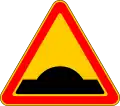 1.16.3 Road for bump
1.16.3 Road for bump 1.16.4 Dip
1.16.4 Dip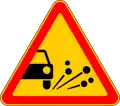 1.17 Gravel surface
1.17 Gravel surface 1.18.1 Narrowing of the road on both sides
1.18.1 Narrowing of the road on both sides 1.18.2 Narrowing of the road on the right
1.18.2 Narrowing of the road on the right 1.18.3 Narrowing of the road on the left
1.18.3 Narrowing of the road on the left 1.18.4 Narrowing of the road on both sides (temporary)
1.18.4 Narrowing of the road on both sides (temporary)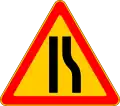 1.18.5 Narrowing of the road on the right (temporary)
1.18.5 Narrowing of the road on the right (temporary) 1.18.6 Narrowing of the road on the left (temporary)
1.18.6 Narrowing of the road on the left (temporary) 1.19.1 Two-way traffic
1.19.1 Two-way traffic 1.19.2 Two-way traffic (temporary)
1.19.2 Two-way traffic (temporary) 1.20 Pedestrian crossing ahead
1.20 Pedestrian crossing ahead 1.21 Children
1.21 Children 1.22 Intersection with a bike path or bike and pedestrian path
1.22 Intersection with a bike path or bike and pedestrian path 1.23 Roadworks
1.23 Roadworks 1.24 Cattle
1.24 Cattle 1.25 Wild animals
1.25 Wild animals 1.26 Falling rocks surface
1.26 Falling rocks surface 1.27 Side wind
1.27 Side wind 1.28 Low-flying aircraft
1.28 Low-flying aircraft 1.29 Accident danger zone
1.29 Accident danger zone 1.30 Other hazards
1.30 Other hazards 1.31.1 Hazard chevron
1.31.1 Hazard chevron 1.31.2 Hazard chevron
1.31.2 Hazard chevron 1.31.3 Hazard chevron
1.31.3 Hazard chevron 1.31.4 Hazard chevron
1.31.4 Hazard chevron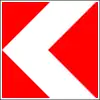 1.31.5 Hazard chevron
1.31.5 Hazard chevron 1.32 Dangerous roadside
1.32 Dangerous roadside 1.33 Icy road
1.33 Icy road 1.34 Congestion
1.34 Congestion 1.35 Seasonal migrations of amphibians
1.35 Seasonal migrations of amphibians 1.36 Driving mode control
1.36 Driving mode control
Priority signs
- 2. Priority signs
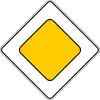 2.1 Priority road
2.1 Priority road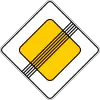 2.2 End of priority road
2.2 End of priority road 2.3.1 Intersection with a secondary road
2.3.1 Intersection with a secondary road 2.3.2 Secondary road junction
2.3.2 Secondary road junction 2.3.3 Secondary road junction
2.3.3 Secondary road junction 2.3.4 Crossroads
2.3.4 Crossroads 2.4 Give way
2.4 Give way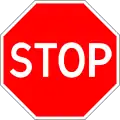 2.5 Stop
2.5 Stop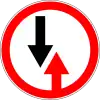 2.6.1 Give way to oncoming traffic
2.6.1 Give way to oncoming traffic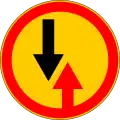 2.6.2 Give way to oncoming traffic (temporary)
2.6.2 Give way to oncoming traffic (temporary)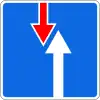 2.7 Priority over oncoming traffic
2.7 Priority over oncoming traffic
Prohibitory signs
- 3. Prohibitory signs
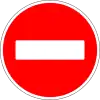 3.1 Entry is prohibited
3.1 Entry is prohibited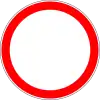 3.2 Traffic is prohibited
3.2 Traffic is prohibited 3.3 The movement of motor vehicles is prohibited
3.3 The movement of motor vehicles is prohibited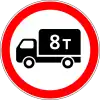 3.4 Lorries exceeding indicated weight prohibited
3.4 Lorries exceeding indicated weight prohibited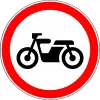 3.5 The movement of motorcycles is prohibited
3.5 The movement of motorcycles is prohibited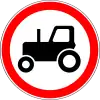 3.6 The movement of tractors is prohibited
3.6 The movement of tractors is prohibited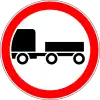 3.7 Driving with a trailer is prohibited
3.7 Driving with a trailer is prohibited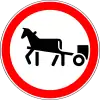 3.8 The movement of horse-drawn carts is prohibited
3.8 The movement of horse-drawn carts is prohibited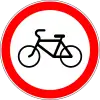 3.9 Cycling is prohibited
3.9 Cycling is prohibited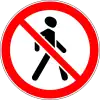 3.10 Pedestrian traffic is prohibited
3.10 Pedestrian traffic is prohibited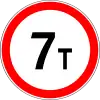 3.11.1 Vehicle weight limit
3.11.1 Vehicle weight limit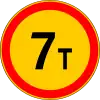 3.11.2 Vehicle weight limit (temporary)
3.11.2 Vehicle weight limit (temporary)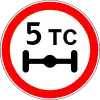 3.12.1 Limitation of the mass per axle of the vehicle
3.12.1 Limitation of the mass per axle of the vehicle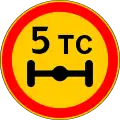 3.12.2 Limitation of the mass per axle of the vehicle (temporary)
3.12.2 Limitation of the mass per axle of the vehicle (temporary)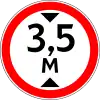 3.13 Height limit
3.13 Height limit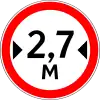 3.14 Width limit
3.14 Width limit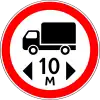 3.15.1 Length limit
3.15.1 Length limit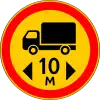 3.15.2 Length limit (temporary)
3.15.2 Length limit (temporary)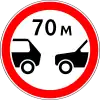 3.16 Limitation of the minimum distance
3.16 Limitation of the minimum distance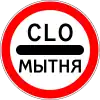 3.17.1 Customs
3.17.1 Customs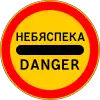 3.17.2 Danger
3.17.2 Danger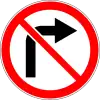 3.18.1 Turning to the right is prohibited
3.18.1 Turning to the right is prohibited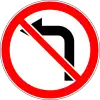 3.18.2 Turning to the left is prohibited
3.18.2 Turning to the left is prohibited 3.19 U-turn is prohibited
3.19 U-turn is prohibited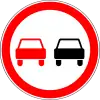 3.20.1 Overtaking is prohibited
3.20.1 Overtaking is prohibited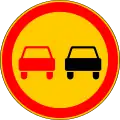 3.20.2 Overtaking is prohibited (temporary)
3.20.2 Overtaking is prohibited (temporary)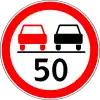 3.20.3 Overtaking is prohibited (overtaking vehicles, the speed of which is more than indicated on the sign, is prohibited)
3.20.3 Overtaking is prohibited (overtaking vehicles, the speed of which is more than indicated on the sign, is prohibited) 3.21.1 End of overtaking prohibition zone
3.21.1 End of overtaking prohibition zone 3.21.2 End of overtaking prohibition zone (temporary)
3.21.2 End of overtaking prohibition zone (temporary)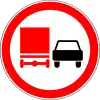 3.22 Overtaking by trucks is prohibited
3.22 Overtaking by trucks is prohibited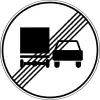 3.23 End of the zone prohibiting overtaking by trucks
3.23 End of the zone prohibiting overtaking by trucks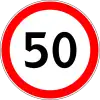 3.24.1 Maximum speed limit
3.24.1 Maximum speed limit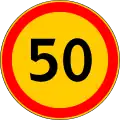 3.24.2 Maximum speed limit (temporary)
3.24.2 Maximum speed limit (temporary) 3.25.1 End of the maximum speed limit zone
3.25.1 End of the maximum speed limit zone 3.25.2 End of the maximum speed limit zone (temporary)
3.25.2 End of the maximum speed limit zone (temporary)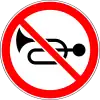 3.26 Beeping is prohibited
3.26 Beeping is prohibited 3.27 Stopping is prohibited
3.27 Stopping is prohibited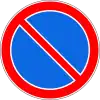 3.28 Parking is prohibited
3.28 Parking is prohibited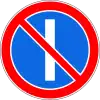 3.29 Parking is prohibited on odd days of the month
3.29 Parking is prohibited on odd days of the month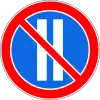 3.30 Parking is prohibited on even days of the month
3.30 Parking is prohibited on even days of the month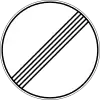 3.31 End of all restrictions zone
3.31 End of all restrictions zone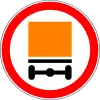 3.32 The movement of vehicles with dangerous goods is prohibited
3.32 The movement of vehicles with dangerous goods is prohibited
Mandatory signs
- 4. Mandatory signs
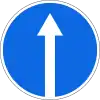 4.1.1 Driving straight
4.1.1 Driving straight 4.1.2 Turn right
4.1.2 Turn right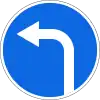 4.1.3 Turn left
4.1.3 Turn left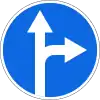 4.1.4 Proceed straight or turn right
4.1.4 Proceed straight or turn right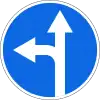 4.1.5 Proceed straight or turn left
4.1.5 Proceed straight or turn left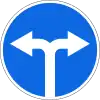 4.1.6 Turn right or left
4.1.6 Turn right or left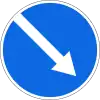 4.2.1 Keep right
4.2.1 Keep right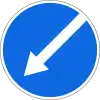 4.2.2 Keep left
4.2.2 Keep left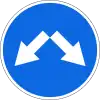 4.2.3 Keep right or left
4.2.3 Keep right or left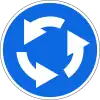 4.3 Direction of roundabout traffic
4.3 Direction of roundabout traffic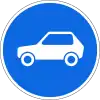 4.4 Passenger car traffic
4.4 Passenger car traffic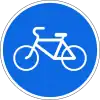 4.5.1 Bicycle path
4.5.1 Bicycle path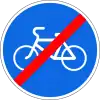 4.5.2 End of bicycle path
4.5.2 End of bicycle path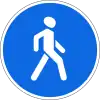 4.6.1 Footpath
4.6.1 Footpath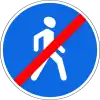 4.6.2 End of footpath
4.6.2 End of footpath 4.7 Minimum speed limit
4.7 Minimum speed limit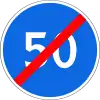 4.8 End of the minimum speed limit zone
4.8 End of the minimum speed limit zone 4.9.1 Direction of movement of vehicles with dangerous goods (turn left)
4.9.1 Direction of movement of vehicles with dangerous goods (turn left) 4.9.2 Direction of movement of vehicles with dangerous goods (proceed straight)
4.9.2 Direction of movement of vehicles with dangerous goods (proceed straight) 4.9.3 Direction of movement of vehicles with dangerous goods (turn right)
4.9.3 Direction of movement of vehicles with dangerous goods (turn right)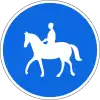 4.10.1 Rider path
4.10.1 Rider path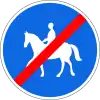 4.10.2 End of rider path
4.10.2 End of rider path
Information signs
- 5. Information signs
 5.1 Motorway
5.1 Motorway 5.2 End of the motorway
5.2 End of the motorway 5.3 Road for cars
5.3 Road for cars 5.4 End of the road for cars
5.4 End of the road for cars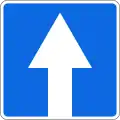 5.5 One-way road
5.5 One-way road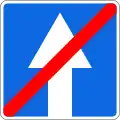 5.6 End of one-way road
5.6 End of one-way road 5.7.1 Exit to a one-way road
5.7.1 Exit to a one-way road 5.7.2 Exit to a one-way road
5.7.2 Exit to a one-way road 5.8.1 Lane directions
5.8.1 Lane directions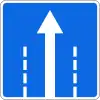 5.8.2 Lane directions
5.8.2 Lane directions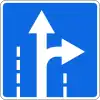 5.8.2 Lane directions
5.8.2 Lane directions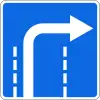 5.8.2 Lane directions
5.8.2 Lane directions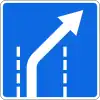 5.8.2 Lane directions
5.8.2 Lane directions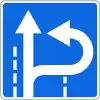 5.8.2 Lane directions
5.8.2 Lane directions 5.8.2 Lane directions
5.8.2 Lane directions 5.8.2 Lane directions
5.8.2 Lane directions 5.8.3 The beginning of the lane
5.8.3 The beginning of the lane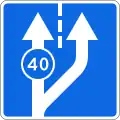 5.8.3 The beginning of the lane
5.8.3 The beginning of the lane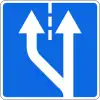 5.8.4 The beginning of the lane
5.8.4 The beginning of the lane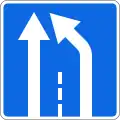 5.8.5 End of the lane
5.8.5 End of the lane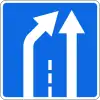 5.8.6 End of the lane
5.8.6 End of the lane 5.8.7 Lane direction
5.8.7 Lane direction 5.8.8 Lane direction
5.8.8 Lane direction 5.8.8 Lane direction
5.8.8 Lane direction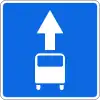 5.9.1 Bus lane
5.9.1 Bus lane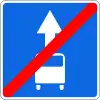 5.9.2 End of bus lane
5.9.2 End of bus lane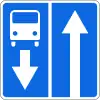 5.10.1 A road with a line for fixed-route vehicles
5.10.1 A road with a line for fixed-route vehicles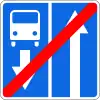 5.10.2 End of the road with a lane for fixed-route vehicles
5.10.2 End of the road with a lane for fixed-route vehicles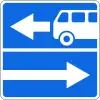 5.10.3 Exit to the road with a lane for fixed-route vehicles
5.10.3 Exit to the road with a lane for fixed-route vehicles 5.10.4 Exit to the road with a lane for fixed-route vehicles
5.10.4 Exit to the road with a lane for fixed-route vehicles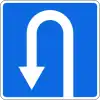 5.11.1 U-turn
5.11.1 U-turn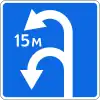 5.11.2 U-turn
5.11.2 U-turn 5.12.1 Bus and/or trolleybus stop location
5.12.1 Bus and/or trolleybus stop location 5.12.2 Bus and (or) trolley bus stop
5.12.2 Bus and (or) trolley bus stop 5.13 Tram stop location
5.13 Tram stop location 5.14.1 Express route stop
5.14.1 Express route stop 5.14.2 Parking place for passenger taxis
5.14.2 Parking place for passenger taxis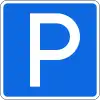 5.15 Parking
5.15 Parking 5.16.1 Pedestrian crossing
5.16.1 Pedestrian crossing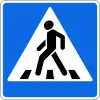 5.16.2 Pedestrian crossing
5.16.2 Pedestrian crossing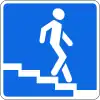 5.17.1 Subway (underpass)
5.17.1 Subway (underpass)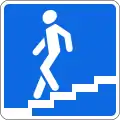 5.17.2 Subway (underpass)
5.17.2 Subway (underpass)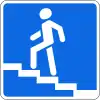 5.17.3 Footbridge
5.17.3 Footbridge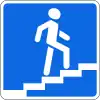 5.17.4 Footbridge
5.17.4 Footbridge 5.18.1 Recommended speed
5.18.1 Recommended speed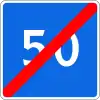 5.18.2 End of recommended speed zone
5.18.2 End of recommended speed zone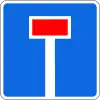 5.19.1 Dead end
5.19.1 Dead end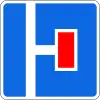 5.19.2 Dead end
5.19.2 Dead end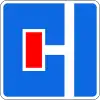 5.19.3 Dead end
5.19.3 Dead end 5.20.1 A preliminary sign of directions
5.20.1 A preliminary sign of directions 5.20.1 A preliminary sign of directions
5.20.1 A preliminary sign of directions 5.20.1 A preliminary sign of directions
5.20.1 A preliminary sign of directions 5.20.1 A preliminary sign of directions
5.20.1 A preliminary sign of directions 5.20.2 A preliminary sign of direction
5.20.2 A preliminary sign of direction 5.20.2 A preliminary sign of direction
5.20.2 A preliminary sign of direction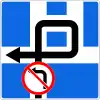 5.20.3 Traffic scheme
5.20.3 Traffic scheme 5.21.1 Pointing direction
5.21.1 Pointing direction 5.21.1 Pointing direction
5.21.1 Pointing direction 5.21.1 Pointing direction
5.21.1 Pointing direction 5.21.2 Pointing directions
5.21.2 Pointing directions 5.22.1 Entrance to built-up area
5.22.1 Entrance to built-up area 5.22.2 Entrance to built-up area
5.22.2 Entrance to built-up area 5.23.1 End of built-up area
5.23.1 End of built-up area 5.23.2 End of built-up area
5.23.2 End of built-up area 5.24 Entrance to locality
5.24 Entrance to locality 5.25 End of locality
5.25 End of locality 5.26.1 Object name (river name)
5.26.1 Object name (river name) 5.26.2 Object name (street name)
5.26.2 Object name (street name) 5.27.1 Distance indicator
5.27.1 Distance indicator 5.27.2 Distance indicator
5.27.2 Distance indicator 5.28 Kilometer sign
5.28 Kilometer sign 5.28 Kilometer sign
5.28 Kilometer sign 5.29.1 Route number (European route number)
5.29.1 Route number (European route number) 5.29.1 Route number (Highway or state roads)
5.29.1 Route number (Highway or state roads) 5.29.1 Route number (Regional roads)
5.29.1 Route number (Regional roads) 5.30.1 Direction of movement for trucks
5.30.1 Direction of movement for trucks 5.30.2 Direction of movement for trucks
5.30.2 Direction of movement for trucks 5.30.3 Direction of movement for trucks
5.30.3 Direction of movement for trucks 5.31 Detour scheme
5.31 Detour scheme 5.32.1 Detour direction
5.32.1 Detour direction 5.32.2 Detour direction
5.32.2 Detour direction 5.32.3 Detour direction
5.32.3 Detour direction 5.33 Stop line
5.33 Stop line 5.34.1 Preliminary index of the lane change to another carriageway
5.34.1 Preliminary index of the lane change to another carriageway 5.34.2 Preliminary index of the lane change to another carriageway
5.34.2 Preliminary index of the lane change to another carriageway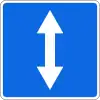 5.35 Reversible lane
5.35 Reversible lane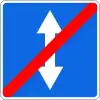 5.36 End of reversible lane
5.36 End of reversible lane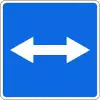 5.37 Entrance to a road with reversible lane
5.37 Entrance to a road with reversible lane 5.38 Residential area
5.38 Residential area 5.39 End of residential area
5.39 End of residential area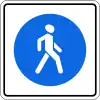 5.40 Pedestrian zone
5.40 Pedestrian zone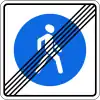 5.41 End of pedestrian zone
5.41 End of pedestrian zone 5.42 Toll road
5.42 Toll road 5.43 End of toll road
5.43 End of toll road
Service signs
 6.1 Point of medical care
6.1 Point of medical care 6.2 Hospital
6.2 Hospital 6.3.1 Gas station
6.3.1 Gas station 6.3.2 Gas station
6.3.2 Gas station 6.3.3 Gas station
6.3.3 Gas station 6.3.4 Charging station
6.3.4 Charging station 6.3.5 Gas station combined with a charging station
6.3.5 Gas station combined with a charging station 6.3.6 Gas station combined with a charging station
6.3.6 Gas station combined with a charging station 6.3.7 Gas station combined with a charging station
6.3.7 Gas station combined with a charging station 6.4 Vehicle maintenance
6.4 Vehicle maintenance 6.5 Car washing
6.5 Car washing 6.6 Phone
6.6 Phone 6.7 Food point
6.7 Food point 6.8 Drinking water
6.8 Drinking water 6.9 Hotel or motel
6.9 Hotel or motel 6.10 Camping
6.10 Camping 6.11 Place of rest
6.11 Place of rest 6.12.1 Militia
6.12.1 Militia 6.12.2 Traffic police post
6.12.2 Traffic police post 6.13 Toilet
6.13 Toilet 6.14 Transport control point
6.14 Transport control point 6.15 Landmark
6.15 Landmark
Additional plates
- 7. Additional plates
 7.1.1 Distance to the object
7.1.1 Distance to the object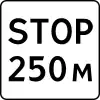 7.1.2 Distance to the object
7.1.2 Distance to the object 7.1.3 Distance to the object
7.1.3 Distance to the object 7.1.4 Distance to the object
7.1.4 Distance to the object 7.2.1 Coverage area
7.2.1 Coverage area 7.2.2 Coverage area
7.2.2 Coverage area 7.2.3 Coverage area
7.2.3 Coverage area 7.2.4 Coverage area
7.2.4 Coverage area 7.2.5 Coverage area
7.2.5 Coverage area 7.2.6 Coverage area
7.2.6 Coverage area 7.3.1 Directions of action
7.3.1 Directions of action 7.3.2 Directions of action
7.3.2 Directions of action 7.3.3 Directions of action
7.3.3 Directions of action 7.4.1 Type of vehicle
7.4.1 Type of vehicle 7.4.2 Type of vehicle
7.4.2 Type of vehicle 7.4.3 Type of vehicle
7.4.3 Type of vehicle 7.4.4 Type of vehicle
7.4.4 Type of vehicle 7.4.5 Type of vehicle
7.4.5 Type of vehicle 7.4.6 Type of vehicle
7.4.6 Type of vehicle 7.4.7 Type of vehicle
7.4.7 Type of vehicle 7.4.8 Type of vehicle
7.4.8 Type of vehicle 7.5.1 Saturdays, Sundays and holidays
7.5.1 Saturdays, Sundays and holidays 7.5.2 Working days
7.5.2 Working days 7.5.3 Days of the week
7.5.3 Days of the week 7.5.4 Validity period
7.5.4 Validity period 7.5.5 Validity period
7.5.5 Validity period 7.5.6 Validity period
7.5.6 Validity period 7.5.7 Validity period
7.5.7 Validity period 7.6.1 Method of parking the vehicle
7.6.1 Method of parking the vehicle 7.6.2 Method of parking the vehicle
7.6.2 Method of parking the vehicle 7.6.3 Method of parking the vehicle
7.6.3 Method of parking the vehicle 7.6.4 Method of parking the vehicle
7.6.4 Method of parking the vehicle 7.6.5 Method of parking the vehicle
7.6.5 Method of parking the vehicle 7.6.6 Method of parking the vehicle
7.6.6 Method of parking the vehicle 7.6.7 Method of parking the vehicle
7.6.7 Method of parking the vehicle 7.6.8 Method of parking the vehicle
7.6.8 Method of parking the vehicle 7.6.9 Method of parking the vehicle
7.6.9 Method of parking the vehicle 7.7 Number of dangerous turns
7.7 Number of dangerous turns 7.8 Paid services
7.8 Paid services 7.9 Limitation of parking duration
7.9 Limitation of parking duration 7.10 Place for car inspection
7.10 Place for car inspection 7.11 Limitation of the permitted maximum mass
7.11 Limitation of the permitted maximum mass 7.12 Road marking
7.12 Road marking 7.13 Direction of the main road
7.13 Direction of the main road 7.14 Traffic lane
7.14 Traffic lane 7.15 Blind pedestrians
7.15 Blind pedestrians 7.16 Wet coating
7.16 Wet coating 7.17 Disabled people
7.17 Disabled people 7.18 Except for the disabled
7.18 Except for the disabled 7.19 Dangerous goods class
7.19 Dangerous goods class 7.20 Tow truck
7.20 Tow truck 7.21 Slippery lane
7.21 Slippery lane 7.22.1 Type of danger
7.22.1 Type of danger 7.22.2 Type of danger
7.22.2 Type of danger 7.22.3 Type of danger
7.22.3 Type of danger 7.22.4 Type of danger
7.22.4 Type of danger 7.23 Emergency help
7.23 Emergency help 7.24 Be an example to your child
7.24 Be an example to your child 7.25 Number of permitted parking spaces
7.25 Number of permitted parking spaces
See also
References
- ↑ "Vienna Convention on Road Signs and Signals - unece" (PDF). United Nations Economic Commission for Europe (UNECE). UNITED NATIONS. Retrieved 12 July 2018.
- ↑ "СТБ 1140-2013 Технические средства организации дорожного движения. Знаки дорожные. Общие технические условия" (PDF). meganorm.ru (in Russian and Belarusian). Retrieved 2023-03-27.
- ↑ "Russification of road signs starts in Mahilyou (photo)". Euroradio.fm. 2015-12-15.
- ↑ "Отличия в ПДД России и Беларуси — Автокадабра". autokadabra.ru. Retrieved 2023-07-30.